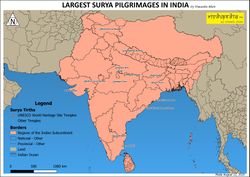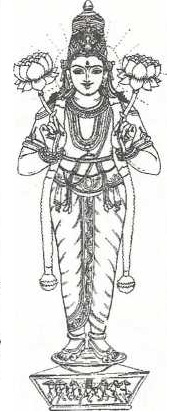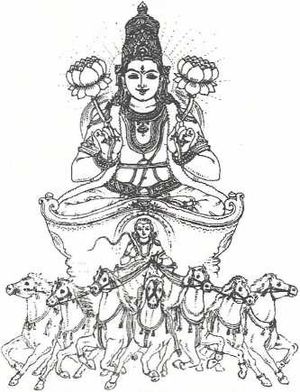Surya
By Swami Harshananda
Surya literally means ‘Sun-god’.
Surya or the sun, often identified with Aditya, Savitr and Pusan, is an important Vedic deity. He is extremely brilliant and rides in an exquisitely beautiful chariot drawn by seven horses. He is compared to a bird that flies in the sky and is described as the jewel of the sky. He gives light, produces day and night, gives power and strength to the living beings, makes them active and destroys their laziness and disease.
Different aspects of Surya[edit]
Savitṛ is the aspect of the sun before sunrise golden in color which establishes people in their respective places. He gives life and energy and guides people in the right path. The famous Gāyatrīmantra is dedicated to this Savitṛ. The nourishing and life-supporting aspect of the sun is personified and praised as Puṣan. He is exceedingly beautiful. He destroys the evil ones with the discus he wears. He looks upon all with an equal eye. He is extremely generous and ever ready to protect.
Story of Surya[edit]
The story of Surya appears in many purāṇas and also the two epics. He was the son of Kaśyapa and Aditi. Sanjñādevī, the daughter of Tvaṣṭṛ, was his wife. Yama and Manu were his sons whereas Yamunā was his daughter. Sāvarṇa and Sanaiścara were his sons born to Chāyādevī.[1] The Aśvins were also his sons born to Sanjñā when she had assumed the form of a mare.
Significant Contributions of Surya in History[edit]
By his blessings, Kuntī[2] gave birth to Karṇa. Aruṇa was his charioteer. When the Pāṇḍavas had been banished to the forest, Yudhiṣthira appeased Surya by an earnest prayer and received the akṣayapātra[3] from him. He bestowed the Śukla Yajurveda on the sage Yājñavalkya at his earnest prayer. Surya is also included in the list of Navagrahas or Nine Planets. He is the images of the Navagrahas in their vicinity with Surya in the center.
References[edit]
- The Concise Encyclopedia of Hinduism, Swami Harshananda, Ram Krishna Math, Bangalore



